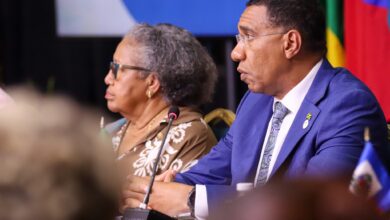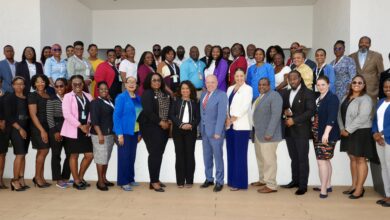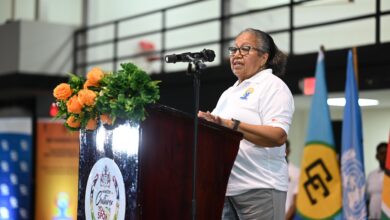On behalf of the Government and people of Saint Lucia, I am pleased to welcome our regional delegates to this CARICOM – OAS – CICAD – EU supported Workshop. For the next four days, we extend to you the keys to the conference of the future as change agents to a new approach in combating drug abuse in our respective territories.
According to the Drug (Misuse) Act of 1988, the Ministry of Health, through the Substance Abuse Advisory Council Secretariat, is the focal point for the implementation of mechanisms for the control, prevention and use of drugs.
Traditionally, the Ministry of Health, because of its operations, has played a more pivotal role towards demand reduction, whilst the Ministry of National Security has given attention to supply reduction. However the time has come for a revised strategy that will seek to address the myriad of problems of drug abuse and its related issues.
To this end, the Substance Abuse Advisory Council Secretariat will, later this year, hold a national meeting with key stakeholders to seek ways to harness a reconfiguration for better and closer relations between supply and demand agencies within Saint Lucia.
The focus of this Workshop, no doubt, is to improve the skills of participants towards the development of national anti-drug strategic plans. In this regard the Government of Saint Lucia welcomes such a workshop as we propose within this year to conduct a national survey on the extent of drug use in Saint Lucia.
Further, this Workshop is also a necessary foundation for us, since it is also the intention of the Government of Saint Lucia to develop a National Anti-Drug Strategic Action Plan within this financial year. It is anticipated that this plan will be the cornerstone for addressing the findings of the drug survey.
Therefore this Workshop will give us an opportunity to rethink our ideological concept in relation to addressing the issue of drug abuse.
Firstly, the issues or the realities of drug abuse, both licit and illicit, should no longer be viewed within prescription lenses that give the obscured vision that drug abuse is principally a health concern or a medical problem.
Secondly, the variables that fertilize the drug trade, and I reiterate both licit and illicit drugs and other substances, are many. These include economics, manufacturing and chemical diversion, commercialization, immigration, social recognition, power and influence. These are often the underpinnings that give significance and sustainability to the illicit drug trade.
On the other hand, as it relates to demand reduction, the victims of drug abuse who are in dire need of drug treatment are often the residue of the supply trade. This is a constant drain on our health services and health budgets. Thus, we must give due consideration to the qualitative and characteristic components of the framework that will guide our intervention processes and approaches.
In your deliberation, the Ministry of Health requests that in your curriculum for skills impartation towards the development of an action plan, the facilitators seek to sensitize participants of the need to combine both supply and demand approaches within the framework. For too long we have treated these components as parallel, distinct and distant, despite the fact that they both target a common enemy, aimed at achieving a common cause. It is time we stop working in isolation.
Unfortunately, whether we are so advised by funding agencies or not, we have expended more funds and resources to supply reduction without equating demand reduction approaches.
Thirdly, our Caribbean region needs to refocus on its public education mechanism. We need, in revising and developing the strategic plan, to seek to have a better understanding of the accessibility of news and information and the role of our media in the Region. Notwithstanding the fact that each country has its own national radio and television station, the cost of media production remains extremely high. There is need to give serious consideration, not only for the planning but also for strategically identifying funding sources to sustain these programmes.
As the old adage goes – ‘the health of the nation is the wealth of the nation’. If this is positive and acceptable then such conceptualization should be the link that knit our social, health, education, security and economic fabric in all we seek to accomplish for a more progressive and law-abiding life for all citizens in the Region.
The Ministry of Health takes this opportunity once again to welcome all of you to our scenic island and we look forward to your diligent consideration and proposals for the way forward, not just for your island, but the way forward for the entire Caribbean region.
I thank you.





